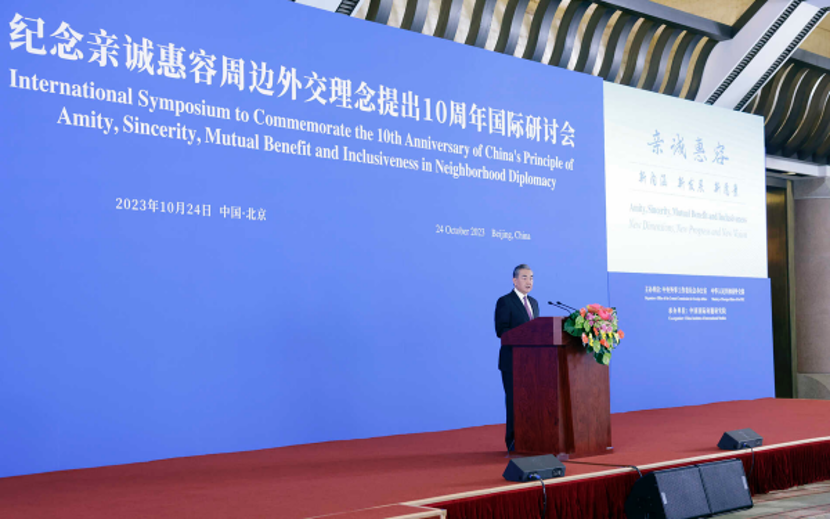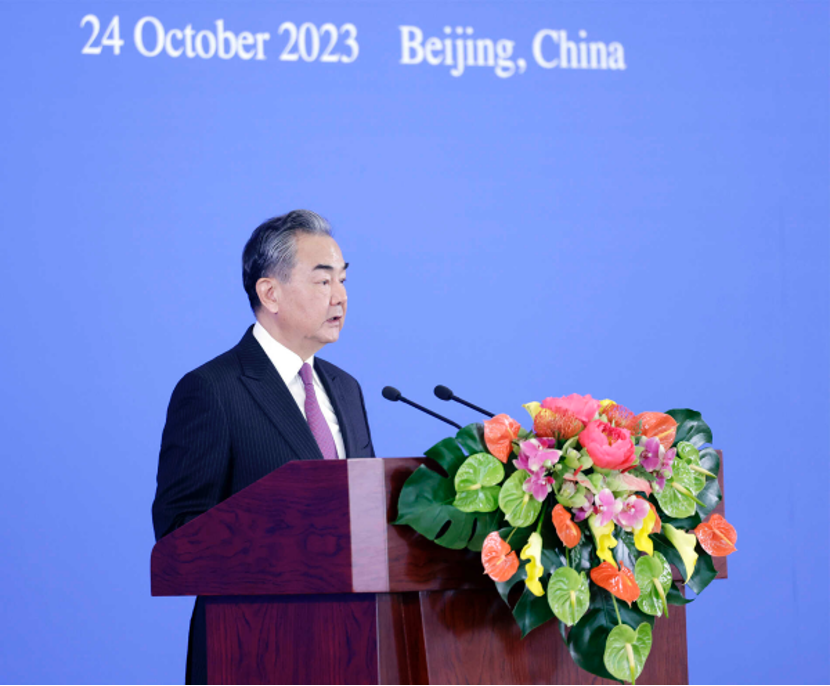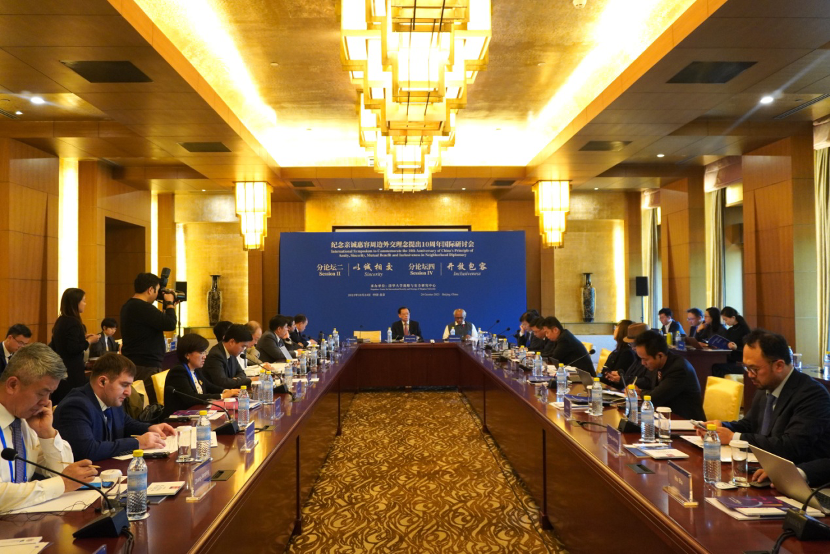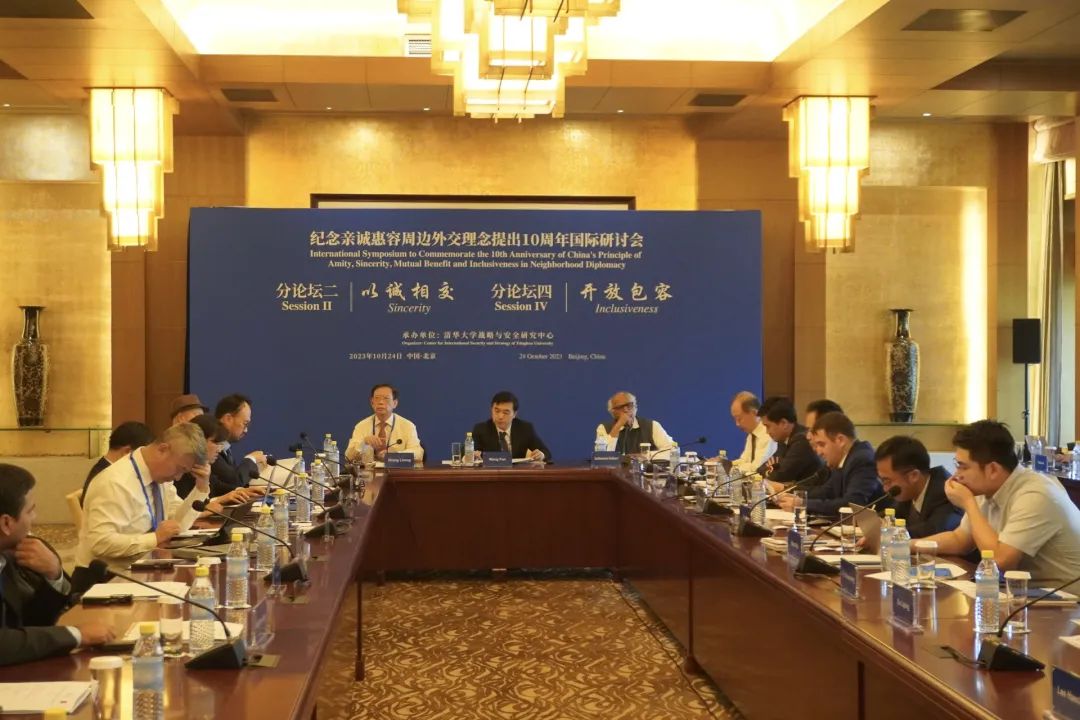On October 24, 2023, the International Symposium to Commemorate the 10th Anniversary of China’s Principle of Amity, Sincerity, Mutual Benefit and Inclusiveness in Neighborhood Diplomacy was held in Beijing. Themed “Amity, Sincerity, Mutual Benefit and Inclusiveness: New Dimension, New Progress and New Vision,” the Symposium was co-hosted by the Office of the Central Commission for Foreign Affairs and the Ministry of Foreign Affairs (MFA) of the People’s Republic of China (PRC) and organized by the China Institute of International Studies (CIIS) and the Center for International Security and Strategy (CISS) of Tsinghua University.

At the opening ceremony of the Symposium, Wang Yi, Member of the Political Bureau of the CPC Central Committee and Director of the Office of the Central Commission for Foreign Affairs, first read written remarks by President Xi Jinping. President Xi Jinping pointed out that in the context of the new era, China will continue to practice the principle of amity, sincerity, mutual benefit and inclusiveness and give it a new connotation to promote Asian values centered on peace, cooperation, inclusiveness, and integration and provide a new impetus for regional unity, openness, and progress.
As Wang Yi said, the Principle has been translated from a concept into actions, and from a vision into reality, taking on new dimensions and delivering continued results. It has injected a strong impetus into friendship, cooperation, unity, and rejuvenation in Asia, and inspired the building of a community with a shared future for mankind. According to Wang Yi, China will keep its foreign policy on its neighborhood consistent and stable. China will uphold the principle of amity, sincerity, mutual benefit and inclusiveness, deepen friendship, cooperation, and the integration of interests with neighboring countries, and jointly build a peaceful, secure, prosperous, beautiful, amicable, and harmonious Asian home, to contribute more wisdom and strength to building an Asian community with a shared future and the community with a shared future for mankind. Wang Yi thus put forward four proposals in this regard: First, all parties should plan together, build together, and benefit together, and become an exemplar of Belt and Road cooperation. Second, all parties should pursue development together, and become a pacesetter for implementing the Global Development Initiative. Third, all parties should work in solidarity, and become a pioneer in implementing the Global Security Initiative. Fourth, all parties should uphold Asian values, and become a front-runner in implementing the Global Civilization Initiative.

Muhammad Sadiq Sanjrani, Chairman of the Senate of Pakistan; Luvsannamsrai Oyun-Erdene, Prime Minister of Mongolia; Pushpa Kamal Dahal Prachanda, Prime Minister of Nepal; Sun Chanthol, Deputy Prime Minister of Cambodia; Fukuda Yasuo, former Prime Minister of Japan; Lee Hae-chan, former Prime Minister of the Republic of Korea (ROK); Kubatbek Boronov, former Prime Minister of Kyrgyzstan; and Zhang Ming, Secretary-General of the Shanghai Cooperation Organization, among others, attended the opening ceremony and delivered speeches either offline or online.
At the closing ceremony, Chen Bo, President of CIIS; and Zhao Kejin, Vice Dean of the School of Social Sciences of Tsinghua University, respectively introduced the Symposium’s Sessions Ⅰ, Ⅱ, Ⅲ, and Ⅳ. Sun Weidong, Vice Minister of the MFA of the PRC, announced the official release of the document Outlook on China’s Foreign Policy on Its Neighborhood in the New Era. It is the first time that China has comprehensively elaborated its neighborhood foreign policy in the form of a document.
Based on the connotation of the principle of amity, sincerity, mutual benefit and inclusiveness in neighborhood diplomacy, the Symposium set up four sessions, inviting experts and scholars in related fields from home and abroad to exchange views on the development process of China’s neighborhood diplomacy. CISS organized Sessions Ⅱ and Ⅳ.

Themed “Sincerity: Mutual Respect and Trust in the Practice of Neighborhood Diplomacy and Cooperation,” Session Ⅱ was moderated by Zhang Lirong, Secretary General of China Forum of CISS. Combining their own research directions, the participating Chinese and foreign experts took concrete examples of the neighborhood diplomacy practices of the Belt and Road international cooperation and the three global initiatives to fully demonstrate the remarkable achievements of the principle of amity, sincerity, mutual benefit and inclusiveness in neighborhood diplomacy since its proposal a decade ago. The participating experts believed that countries should adhere to the concept of “Sincerity,” respect and communicate with each other in good faith, enhance mutual trust, and strengthen cooperation amid turbulence in the global landscape. The principle of amity, sincerity, mutual benefit and inclusiveness in neighborhood diplomacy is conducive to the promotion of economic development and economic and trade cooperation among countries. The Principle in neighborhood policy is not only a foreign policy concept but also has rich cultural connotations, and humanistic exchanges are also an important approach to building a community with a shared future for mankind.
Themed “Inclusiveness: Practical Exploration of Building an Asia-Pacific Community with a Shared Future,” Session Ⅳ was moderated by Wang Fan, China Forum Expert and President of China Foreign Affairs University. Combining their own research directions and the current development situation of their countries, experts and scholars from India, China, ROK, Cambodia, and Kazakhstan conducted in-depth discussions on topics of how to practice the Principle, build an inclusive regional order, and respond to the U.S. Indo-Pacific Strategy in the Asia-Pacific region, especially in South Asia, against the background of intensified geopolitical crisis and frequent economic dilemmas. By reviewing the history of China’s neighborhood diplomacy, the participating experts highly recognized the fruitful cooperation results achieved in the past decade since the proposal of the Principle and emphasized the profound importance of optimizing regional cooperation mechanisms and promoting the development of inclusive multilateralism by taking multi-dimensional examples of the China-Pakistan Economic Corridor, Free Trade Area of the Asia-Pacific construction, South China Sea issue, and China-India border conflict.

In addition, themed “Amity: Building a Regional Relation Featuring Peace, Friendliness, and Mutual Assistance,” Session Ⅰ was moderated by Rong Ying, Vice President of CIIS. Participating experts discussed how China and its neighboring countries could jointly create a peaceful, and friendly regional environment of mutual assistance, and emphasized the important role of continuing to practice the Principle in enhancing the political mutual trust and cooperation with neighboring countries, promoting people-to-people exchanges, and advancing the building of a community with a shared future with the neighboring countries.
Themed “Mutual Benefit: Tightening the Ties of Interests for Complementary Advantages and Common Development,” Session Ⅲ was moderated by Liu Qing, Vice President of CIIS. Experts from home and abroad discussed how China and its neighboring countries should seize the new development opportunities in the post-epidemic era, deepen mutual benefit, strengthen complementary advantages, and promote common development. They concluded that in the next stage, China should continue to uphold the principle of mutual benefit, solidly push forward the Belt and Road construction in the fields of economy and trade, investment, tourism, and humanistic exchanges, and enhance regional connectivity to increasingly benefit neighboring countries and peoples.
